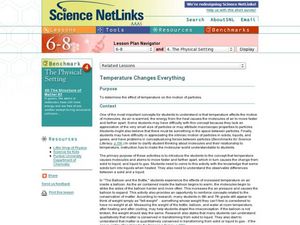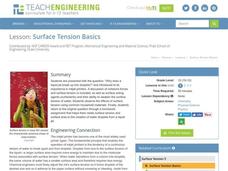Curated OER
Temperature Changes Everything
Middle school chemists visit interactive websites in order to discover what happens to molecular motion when heat is added to matter. They conduct an experiment that demonstrates the expansion of matter with the addition of heat. A lab...
Virginia Department of Education
Molecular Model Building
During this hands-on activity, young chemists build molecular models based on the Lewis dot structure before studying valence shell electron pair repulsion theory.
Curated OER
DNA Extraction
Students discover the basic structure of DNA and its function in living organisms by conducting an experiment in which they extract DNA from bananas using a lysis buffer solution.
Curated OER
Chemistry Practice
For this chemistry overview worksheet, students calculated the volume of different gases and liquids given in a word problem. Students had to calculate the molecular mass and write the empirical formula and the molecular formula.
Curated OER
Bonding Exercises
In this chemical compounds worksheet, young scholars complete a graphic organizer by determining the electron dot formula, molecular shape, bond angle, bond polarity, and molecular polarity for 7 given compounds.
Teach Engineering
Wetting and Contact Angle
Explore terminology related to water droplets. The sixth installment of a nine-part series teaches young scientists about wetting and contact angles between water droplets and surfaces. It also distinguishes between hydrophobic and...
Teach Engineering
Superhydrophobicity – The Lotus Effect
Discover and demonstrate the Lotus Effect and superhydrophobic surfaces with the eighth installment of a nine-part series that teaches scholars about surfaces that exhibit superhydrophobicity. The lesson plan continues...
Teach Engineering
Imagining DNA Structure
Let's get a closer look at DNA and other molecular structures. The first lesson in the series of four introduces a variety of imagining techniques that engineers and scientists use to visualize molecular structures. The resource presents...
Teach Engineering
Surface Tension Basics
Back to the basics (of surface tension). The first installment of a nine-part series teaches young scholars about the basics of surface tension and how it relates to water droplets. They also learn how this concept allows for the...
Towson University
Berries...With a Side of DNA?
Sometimes science lab can be ... delicious! Middle school science scholars extract DNA from strawberries and other fruits in an engaging lab activity. The teacher's guide includes pacing, materials list, and worksheets with answer keys.
Towson University
Case of the Crown Jewels
Can your biology class crack the Case of the Crown Jewels? Junior forensics experts try their hands at DNA restriction analysis in an exciting lab activity. The lesson introduces the concept of restriction analysis, teaches pipetting and...
Beyond Benign
Cookie Equations
Cookies and chemical equations have a lot in common! Using cookies as a reference, scholars learn to balance chemical equations. Pieces of the cookies represent different parts of the compounds and elements. This is the sixth installment...
Curated OER
Investigation of Crystallinity in Polymeric Materials
A kaleidoscope is constructed using polarizing polymer paper and then low-density polyethylene, high-density polyethylene, and polypropylene are all melted onto individual glass slides and examined through a microscope. The intent is to...
Curated OER
Using a Controlled Experiment to Identify Two Unknown Plasmids
Student demonstrate knowledge of recombinant DNA techniques (restriction enzyme digest, gel electrophoresis, and staining gel). They demonstrate skills needed to complete a gel electrophoresis and interpret a stained gel. Pupils solve...
NASA
The Case of the Wacky Water Cycle
Join the tree house detectives in learning about the processes of the water cycle, water conservation, water treatment, and water as a limited resource.
American Chemical Society
Different Substances React Differently
Looks don't tell the whole story. Young experimenters explore reactions with substances that look similar. They observe the reactions that take place when combined with baking soda and use indicators to conclude they react differently...
American Chemical Society
Mixing Liquids to Identify an Unknown Liquid
Yellow and blue make green in a colorful lesson on liquid solutions. The seventh installment of a 16-part Inquiry to Action series asks pupils to mix different-colored solutions and record their observations. They then use their...
American Chemical Society
Identifying an Unknown Liquid
Liquids are what's the matter with the activity! Learners investigate properties of different liquids as they interact with various types of paper. They then use their observations to identify a mystery liquid to finish the sixth...
American Chemical Society
Matter Is Made of Tiny Particles
Believe in the invisible and convince the class that tiny particles exist even if they can't see them! A thorough lesson investigates all phases of matter and provides pupils hands-on experiences that demonstrate that all matter is made...
American Chemical Society
What Makes It Snow?
Discover the icy world of snow from the comfort of the indoors. Young meteorologists study visuals and a video to examine snow formation and structure. Using the information they learn, scientists follow a procedure to construct a...
American Chemical Society
What is Wind?
Engage creative minds with an exciting activity about the power of wind. Investigators participate in class discussions while viewing images and animations of air and wind. Scholars test the relationship between wind speed and an...
American Chemical Society
What Makes it Rain?
Clouds come alive when curious minds create rain in an action-packed activity. Scholars view a video of rain and analyze an image of water uses to generate a class discussion leading into a hands-on exploration. Using a set of...
Curated OER
Polymers
Students explore online tutorial on polymers. In this chemistry lesson plan, they create two polymers in the lab and compare their properties. They write a sales letter about their new and improved polymer product.
Curated OER
Stereoisomers
Learners investigate stereoisomers using models that can be rotated and manipulated. In this stereoisomers lesson plan, students try to make models of molecules look alike by rotating the bonds. Using a mirror, the teacher demonstrates...
Other popular searches
- Atoms and Molecules
- Gumdrop Atoms and Molecules
- Atoms & Molecules
- Compounds and Molecules
- Water Molecules
- Organic Molecules
- Atoms Molecules
- Building Molecules
- Molecules of Life
- Gas Molecules
- Matter and Molecules
- Biological Molecules























